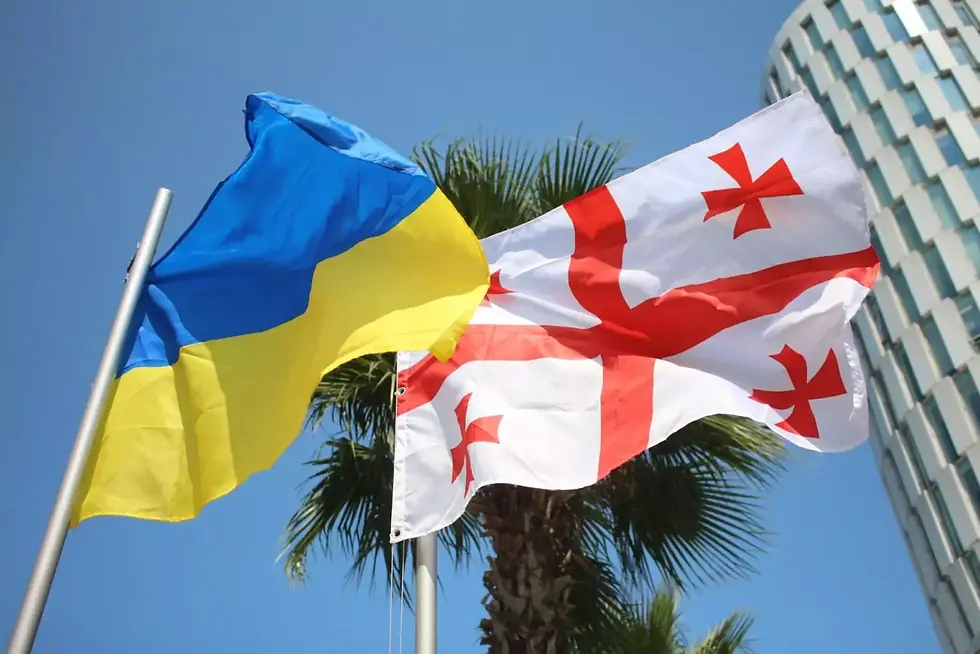Georgian Authorities Launch First FARA Probe, Threatening NGOs with Criminal Charges
- IHR
- Aug 16, 2025
- 4 min read

Tbilisi, Georgia – Six prominent non-governmental organisations (NGOs) in Georgia have reported receiving threatening letters from the Anti-Corruption Bureau, marking the first official probe under the controversial "Foreign Agents Registration Act" (FARA) adopted earlier this year. The move signals the Georgian government's intent to enforce the law against critics, unlike previous iterations.
The letters, received on 11 August 2025, accuse the NGOs of violating the FARA law by failing to register as "foreign agents" and warn them of criminal liability. Non-compliance with Georgia's FARA law can lead to penalties of up to five years in prison, a fine of up to ₾10,000 ($3,600), or both.
Targeted Organisations and Accusations
The six organisations targeted are:
• Sapari
• The Civil Society Foundation
• Transparency International Georgia
• The Media Development Foundation
• The Social Justice Center
• The International Society for Fair Elections and Democracy (ISFED)
According to the NGOs, the Anti-Corruption Bureau is demanding an explanation for their failure to join the "foreign agents" register. The letters, seen by OC Media, suggest the groups may have engaged in "political activity" aimed at "shaping, adopting, or influencing Georgia’s domestic or foreign policy," or activity driven by the interests of a foreign government or political party.
The Bureau also requested explanations regarding "what evidence has been destroyed" in the context of FARA, citing public statements made by the NGOs. This likely refers to a June remark by Sapari’s director, Baia Pataraia, who stated that the majority of the organisation’s archives had been destroyed to protect sensitive information about beneficiaries, such as women and children, from falling into the wrong hands.
NGOs' Resolute Stance
In a joint statement, the NGOs have categorically refused to register. They reiterated their public position that they "do not intend to live under Russian laws" and will not register as representatives of a foreign state.
The organisations firmly stated:
• "We are independent Georgian non-governmental organisations operating under our own charters".
• "Our mission is to defend the rights of women, children, workers, people with disabilities, refugees and all those who are oppressed; to monitor elections, expose corruption and disinformation, defend democracy, and support the people of Georgia".
• "We serve only the interests of our people and of Georgia".
They also highlighted that under the US FARA standard, which the Georgian law supposedly copies, they are under no obligation to register. They intend to send a formal legal response to the Anti-Corruption Bureau.
Broader Context: A Legislative Crackdown
The FARA law was adopted by the ruling Georgian Dream government on 1 April, presented as a "word-for-word translation" of the US Foreign Agents Registration Act, following widespread backlash against a similar 2024 foreign agent law labelled a "Russian law". Critics argue that, unlike the US law, Georgia's FARA is being used to target civil society and media organisations.
The NGOs view the persecution as an attempt to "destroy democracy" in the style of "Putin’s Russia," but vow to "continue our work and will not abandon the people of Georgia". They pledged to "fight until Georgia becomes the free, democratic EU member state its people deserve".
This probe is part of a broader "legislative crackdown against civil society" by the Georgian Dream party, which has adopted several restrictive laws and amendments targeting NGOs and independent media in recent months. This includes amendments requiring government permission for NGOs to receive foreign grants and for donor organisations to submit grant copies beforehand. The enforcement of both the FARA law and grant regulations has been entrusted to the Anti-Corruption Bureau, which operates under the Prime Minister’s Office.
Critics insist these changes aim to undermine media and civil society in an already fragile democracy, despite the ruling party's claims that new legislation is necessary to combat "external powers'" influence.
Domestic and International Condemnation
The opposition United National Movement (UNM) described the situation as "Ivanishvili’s regime fighting against all parties, NGOs, free media and citizens who oppose the establishment of Russian dictatorship in this country". They expressed "full solidarity and support" for the targeted NGOs. The opposition coalition Strong Georgia condemned the actions as "repression aimed solely at silencing the Georgian people and crushing the country’s civil society".
Internationally, Estonian Prime Minister Kaja Kallas and Moldovan President Maia Sandu issued a joint statement, saying "Georgia’s foreign agents’ law is an aggressive crackdown on dissent". They warned that "the law threatens Georgia’s path to the European Union" and placed "responsibility solely with the Georgian authorities". The Ukrainian foreign ministry also commented, stating, "Sad to see Georgian government obeying Moscow". The U.S. State Department released a critical 2024 human rights report on Georgia.
The latest action by the Anti-Corruption Bureau follows a previous June court-backed request for extensive information from civil society organisations, which NGOs largely resisted due to concerns about sensitive beneficiary data. Despite the challenges, the targeted NGOs remain steadfast in their commitment to serving the interests of the Georgian people and upholding democratic values.
.png)



Comments